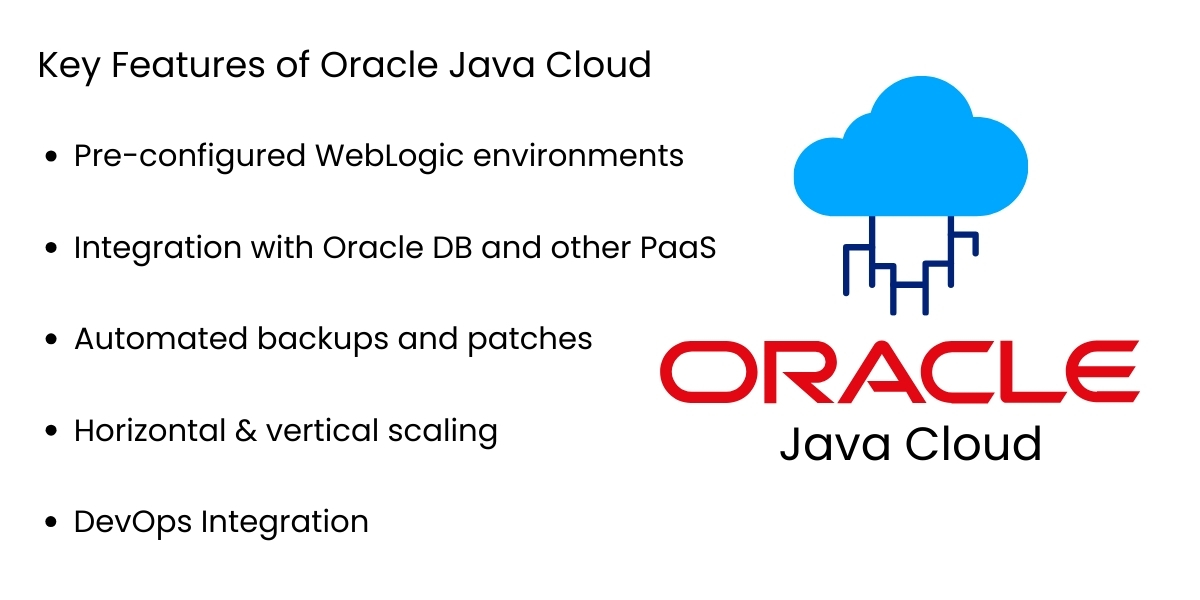In today’s fast-paced digitized world, businesses must deploy applications rapidly and easily scale them. Oracle Java Cloud Service provides Java developers with a powerful cloud platform to build, deploy, and easily scale Java EE applications in the cloud using Oracle’s infrastructure and enterprise tools.
Whether you’re moving existing applications or starting from scratch, Oracle Java Cloud helps you streamline the process, improve productivity, and ensure performance under increasing workloads.
What is Oracle Java Cloud Service?
Oracle Java Cloud Service is a Platform-as-a-Service (PaaS) that allows you to build and manage Java applications on Oracle Cloud Infrastructure (OCI). It is fully integrated with Oracle DB and WebLogic Server, providing flexibility, scalability, and high availability for enterprise applications.
Oracle Java Cloud Applications Deployment
1. Application Preparation
Design and build your Java EE application locally using Eclipse or IntelliJ, then deploy it onto Oracle WebLogic Server.
2. Application Packaging
Package your application as a WAR or EAR file for deployment.
3. Provision the Java Cloud Service
Provision a new Java Cloud by accessing the Oracle Cloud console, selecting your desired WebLogic version, compute size, and storage.
4. Deploy Your Application
Deploy your packaged application using the WebLogic admin console, Oracle Cloud dashboard, or automating using DevOps pipelines.
5. Monitor & Scale
Use Oracle’s built-in monitoring tools to monitor performance and scale your application up or out as necessary through the flexibility of OCI infrastructure.
Scaling Java Applications In Oracle Java Cloud
Scaling in Oracle Java Cloud is strategic and simple:
- Vertical Scaling is increasing memory, CPU, or JVM heap for performance potential.
- Horizontal Scaling is adding more WebLogic Instances to accommodate an increase in concurrent users.
- Auto-Scaling (through OCI) is adding meaningfully using Oracle Cloud’s auto-scaling policies along with responding to real-time increased demand.
Any one of these capabilities standing alone or combined makes Oracle Java Cloud powerful for enterprises who want both business control and flexibility with their cloud applications.
Why Choose Oracle Java Cloud for Enterprise Java Apps?
Selecting the appropriate hosting platform for your enterprise Java applications is vital for long-term success. Oracle Java Cloud Service is a strong, secure platform and is specifically designed for enterprise use. Here are some key features:
Enterprise-Grade Security
Oracle Java Cloud is built with security as a priority. It contains:
- Identity and Access Management (IAM): Control user permissions with fine-grained role-based access.
- Data Encryption: Encrypted sensitive data at rest, and in transit.
- Firewall and Network Isolation: Secure your environment utilizing VCNs, private subnets and customizable security lists.
- Compliance: Oracle Cloud provides security comfortable with standards such as SOC, ISO and GDPR compliance.
All of these features provide protection against data breaches and unsecured access to code that your business must ensure from a reputational perspective and from a financial and legal standpoint, especially in banking, healthcare and government.
High Availability & Reliability
Enterprise applications must be high availability and reliable. Oracle Java Cloud provides:
- Multi-AZ (Availability Zone) Redundancy: Automatically spread workloads between multiple zones to provide failover redundancy within Oracle Cloud.
- Automated Backups and Recovery: Restore backups from snapshots with little time loss after system failure occurs.
- Clustered WebLogic Deployments: Provide load balancing and fault tolerance when deploying critical enterprise applications.
Therefore, as long as you have a budget in mind (standard costing is usually hourly/monthly), you can maintain business continuity to minimize downtime with Java Cloud, even if there happens to be a spike in traffic or even in case of a failure.
Effortless Oracle Ecosystem Integration
Oracle Java Cloud integrates smoothly with other Oracle solutions:
- Oracle Database Cloud Service for fast and authoritative data storage
- Oracle Identity Cloud Service for authentication and SSO
- Oracle Analytics, ERP, and SaaS Apps for deeper intelligence and smart business operations.
If your company is already using Oracle solutions, Java Cloud Service is the perfect, low-friction addition to your stack.
Built-in Support for CI/CD and DevOps
Modern Java development depends on agile methods, and Oracle Java Cloud supports both:
- Continuous Integration (CI): Integrate with tools like Jenkins, Git, and Maven.
- Continuous Delivery (CD): Automate your CD pipelines with Oracle Developer Cloud Service.
- Test & Staging Environments: See how cloned environments help to bring up a test environment before pushing code to production.
This allows your team to be faster – building and releasing features quickly and confidently.
Developer Productivity and Control
Unlike generic cloud platforms, Oracle Java Cloud is built specifically for Java EE. Developers can:
- Build quickly on pre-configured WebLogic Environments, reducing lead time.
- Have Admin Console and SSH Access for low-level server configuration.
- Use an IDE like Eclipse or IntelliJ, making it easier and faster to develop.
These features improve workflow and provide flexibility and control over what your applications do and how they perform.
Final Thoughts
Oracle Java Cloud Service is more than just a hosting service; it is a fully managed, enterprise-ready cloud environments that can support the most demanding Java applications.
Whether you are:
- Migrating legacy Java EE applications
- Building cloud-native Java services
- Scaling applications to a world-wide audience
- Oracle Java Cloud has everything you need to be successful.
With Oracle’s global cloud infrastructure, built-in security features, and deep enterprise workload support, it remains the platform of choice for organizations that need to run mission-critical Java applications at scale.
Deploy and Scale Your Java Applications with Confidence
Looking to deploy secure and scalable Java applications on the cloud? Empirical Edge helps businesses build, migrate, and optimize Java applications on Oracle Cloud for maximum performance and reliability.
Frequently Asked Questions
Oracle Java Cloud Service is a Platform-as-a-Service (PaaS) that allows developers to build, deploy, and manage Java applications on Oracle Cloud Infrastructure. It provides pre-configured environments such as WebLogic Server and integrates with Oracle Database and DevOps tools.
Yes. Oracle Java Cloud is designed for enterprise workloads and supports clustering, load balancing, and high availability to ensure reliable performance under heavy traffic.
Java applications can be deployed on Oracle Cloud by packaging the application into a deployable format such as a WAR or JAR file and uploading it to the cloud environment. Once deployed, developers can configure servers, connect databases, and monitor application performance through cloud management tools.
Oracle Java Cloud helps scale applications by allowing additional computing resources to be added as demand increases. Businesses can expand server capacity or add multiple instances of an application to maintain performance during high traffic periods.












